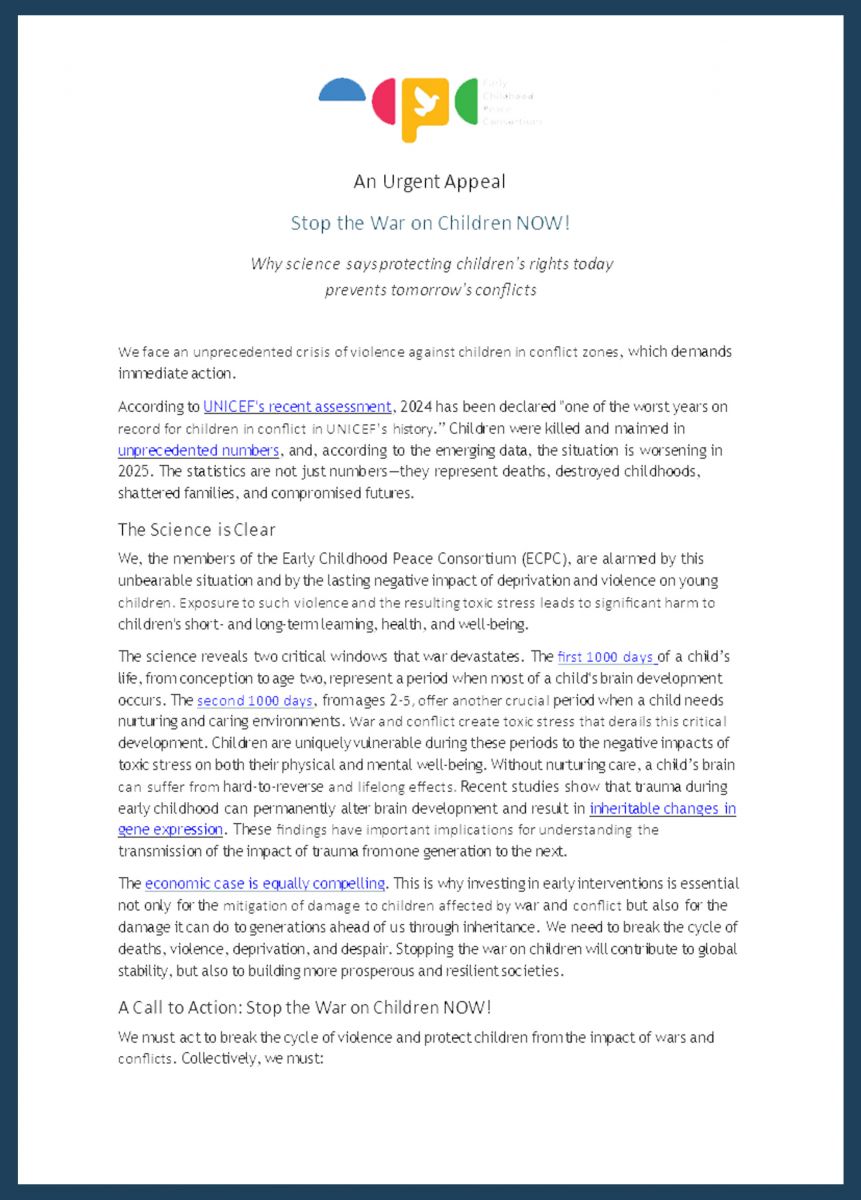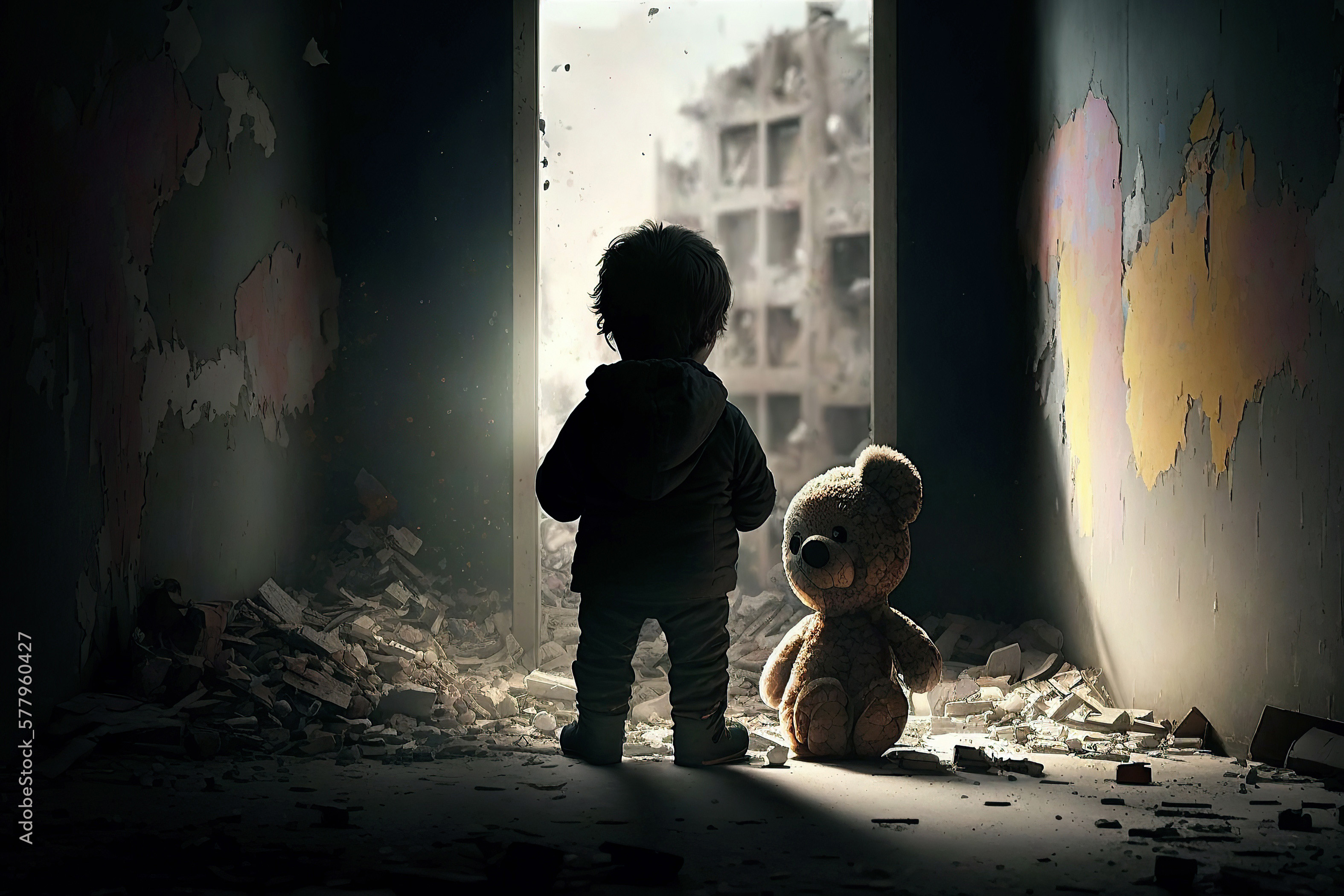ECPC urgent appeal “Stop the War on Children NOW!
Why science says protecting children’s rights today prevents tomorrow’s conflicts
Child with plush toy in destroyed bombed city. AdobeStock_577960427
The Situation
 We face an unprecedented crisis of violence against children in conflict zones, which demands immediate action.
We face an unprecedented crisis of violence against children in conflict zones, which demands immediate action. According to UNICEF's recent assessment, 2024 has been declared "one of the worst years on record for children in conflict in UNICEF's history.” Children were killed and maimed in unprecedented numbers, and, according to the emerging data, the situation is worsening in 2025. The statistics are not just numbers—they represent deaths, destroyed childhoods, shattered families, and compromised futures.
The Science is Clear
We, the members of the Early Childhood Peace Consortium (ECPC), are alarmed by this unbearable situation and by the lasting negative impact of deprivation and violence on young children. Exposure to such violence and the resulting toxic stress leads to significant harm to children's short- and long-term learning, health, and well-being.
The science reveals two critical windows that war devastates. The first 1000 days of a child’s life, from conception to age two, represent a period when most of a child's brain development occurs. The second 1000 days, from ages 2-5, offer another crucial period when a child needs nurturing and caring environments. War and conflict create toxic stress that derails this critical development. Children are uniquely vulnerable during these periods to the negative impacts of toxic stress on both their physical and mental well-being. Without nurturing care, a child’s brain can suffer from hard-to-reverse and lifelong effects. Recent studies show that trauma during early childhood can permanently alter brain development and result in inheritable changes in gene expression. These findings have important implications for understanding the transmission of the impact of trauma from one generation to the next.
The economic case is equally compelling. This is why investing in early interventions is essential not only for the mitigation of damage to children affected by war and conflict but also for the damage it can do to generations ahead of us through inheritance. We need to break the cycle of deaths, violence, deprivation, and despair. Stopping the war on children will contribute to global stability, but also to building more prosperous and resilient societies.
A Call to Action: Stop the War on Children NOW!
We must act to break the cycle of violence and protect children from the impact of wars and conflicts. Collectively, we must:
Maintain unwavering advocacy to uphold children’s rights and stop the war on children and their families, making this a global priority.
Raise the voices of children and families, so they echo throughout the world and in the conference rooms of the United Nations. Let them tell their stories of sacrifice, determination, and hope for a better future.
Protect children in war and conflict by supporting their mothers, fathers and other caregivers. Upholding the rights and safety of caregivers is a fundamental condition for the protection of children.
Ensure that Early Childhood Development evidence-based programmes are prioritized as lifesaving and continue throughout humanitarian responses.
For more than two decades, members of the Early Childhood Peace Consortium have been researching, advocating, and implementing programmes so that every child can thrive, and we have been demonstrating how to build a pathway to more cohesive and peaceful societies.
We join the United Nations and other international organizations’ calls to take concrete steps to stop the war on children now.
We thank you for your commitment to children’s rights, both nationally and internationally.
We count on you.
Together, we must Stop the War on Children NOW!
________________________________________
Who We Are
The Early Childhood Peace Consortium (ECPC) is a global consortium of United Nations agencies, Non-Governmental Organizations, academia, practitioners, and the private sector focused on sharing scientific- and practice-based evidence on how investment in early childhood development (ECD) can contribute to sustainable peace, social cohesion, and social justice. We recognize that investing in ECD is a powerful and cost-effective strategy for reducing violence, poverty, and exclusion while building peaceful societies.
For more information about our initiatives and/or to speak directly with an ECPC representative about this appeal, please contact us at secretariat@ecdpeace.org.
June 2025
JOIN THE CONVERSATION
For breaking news and to stay connected, follow us on social media. Sign up to get our E-News delivered straight to your inbox.


